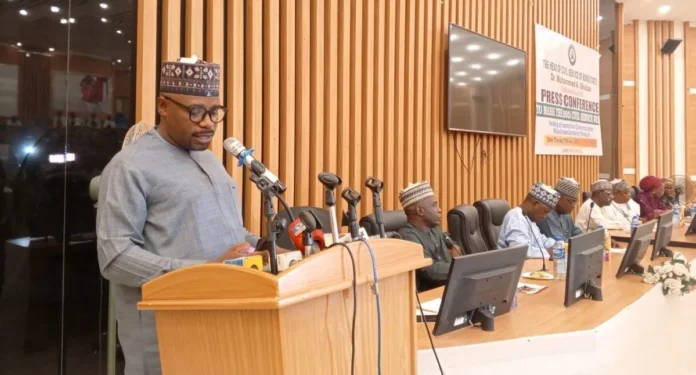By: Babagana Bukar Wakil, Maiduguri
The Head of Civil Service of Borno State, Dr. Muhammad A. Ghuluze, addressed stakeholders, the media, and the public on July 17, 2025, in commemoration of the 2025 Civil Service Week. The event served as a reflective and forward-looking platform, highlighting the journey of the state’s public service system while emphasizing the importance of innovation, resilience, and collective accountability.
Speaking during the event, Dr. Ghuluze noted that the 2025 Civil Service Week offered a timely opportunity to take stock of past efforts, assess key reforms, and communicate openly with citizens on the government’s vision for a more effective and people-centered public administration. He emphasized that this moment was not just ceremonial but an affirmation of the commitment of the civil service to transform itself in line with emerging realities and public expectations.
This year’s theme, “Revitalizing Public Service for a Secure, Inclusive, and Digital Future,” speaks directly to the strategic direction adopted under the leadership of Governor Babagana Umara Zulum. According to Dr. Ghuluze, the theme aligns with broader national reforms and underscores Borno State’s resolve to build a civil service that is inclusive, transparent, technology-driven, and fully responsive to the evolving needs of society.
Reflecting on the role of the civil service, he praised the efforts of public servants who have continued to ensure the continuity of government operations, especially in the face of post-insurgency challenges. Despite security threats and resource limitations, the civil service has remained a stabilizing force and a key driver of institutional governance, social reconstruction, and policy delivery in the state.
Highlighting key achievements between June 2024 and June 2025, Dr. Ghuluze disclosed that promotion examinations were successfully conducted to support career growth and motivate personnel. He also cited the progress made in digitizing operations across several ministries and agencies, marking a significant shift toward a modern governance framework.
Capacity building was another area of focus, with hundreds of civil servants trained in information technology, public financial regulations, ethical standards, and leadership development. Pension processing was also streamlined, reducing delays by over 60 percent, while welfare reforms ensured full implementation of the new minimum wage. Furthermore, all preparatory work for launching the Public Sector Health Insurance Scheme had been finalized to reduce out-of-pocket health expenditures.
Recruitment into critical sectors particularly in education, health, and administration helped fill service delivery gaps and ensured continuity of essential public functions. These efforts, he stressed, represent concrete steps toward strengthening the quality of governance in the state.
However, Dr. Ghuluze acknowledged the serious challenges that still confront the civil service. The 2024 Maiduguri flood disaster caused extensive damage to key administrative infrastructure, particularly at the Musa Usman Secretariat, which disrupted digitization timelines. Financial constraints have also limited recruitment efforts, logistics, and training capacity, while security conditions in some local government areas continue to restrict operations. He pointed out the urgent need to close the digital literacy gap among staff to achieve full integration into a tech-enabled work culture.
Looking ahead, the state government’s reform agenda remains focused on creating a civil service that is efficient, innovative, and responsive. Major plans for 2025–2026 include the deployment of biometric attendance systems to ensure accountability, the launch of a public service innovation lab to drive creative problem-solving, and the rollout of a civil servants’ health and wellness scheme. Regular capacity-building efforts will also be sustained to ensure that public servants remain equipped with relevant knowledge and skills.
Dr. Ghuluze called on all civil servants to recommit themselves to professionalism, discipline, and innovation. He appealed to the media to play its role in informing and engaging the public constructively. Citizens were urged to actively participate in governance by demanding accountability and supporting reforms, while development partners were invited to deepen collaboration in the shared task of rebuilding Borno.
He also announced several new initiatives, including the launch of the 2025 Civil Service Innovation Award to recognize outstanding contributions, the formation of a monitoring and evaluation taskforce to track reform progress, and the rollout of a mentorship programme to nurture future leaders. Additionally, the SERVICOM framework will now be fully implemented across all government agencies to enhance transparency, service quality, and public trust.
Dr. Ghuluze concluded with a reminder that the strength and legitimacy of any government rest on the quality of its public service. He expressed confidence that through innovation, resilience, and partnership, the Borno State Civil Service will evolve into an institution worthy of its legacy and capable of meeting the demands of a modern, democratic society.




